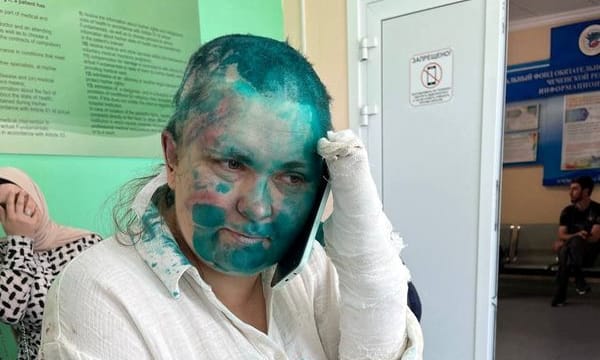
Prominent female Russian journalist and lawyer brutally attacked in Chechnya
By Andrew Osborn
(Reuters) -Armed masked men attacked and seriously injured a prominent female Russian journalist and a lawyer in the Russian region of Chechnya on Tuesday morning after forcing their car to stop, the journalist, her employer and rights groups said.
Yelena Milashina, a well-known journalist for the Novaya Gazeta newspaper, was travelling to the Chechen capital Grozny from the local airport with Alexander Nemov, a lawyer, when they were attacked.
Milashina and Nemov, who had planned to attend a court hearing in the case of a woman they believed was being unjustly persecuted for political reasons, have been transferred to a hospital in a neighbouring region and are expected to be flown to Moscow for further treatment.
"It was a classic kidnapping... They pinned (our driver) down, threw him out of his car, got in, bent our heads down, tied my hands, knelt me down there, and put a gun to my head," Milashina told Mansur Soltayev, a Chechen human rights official, as she lay in hospital in Grozny before being transferred.
Memorial, a rights group outlawed in Russia, said that Milashina and Nemov had been "brutally kicked, including in the face, threatened with death, had a gun held to their heads, and had their equipment taken away and smashed."
"While being beaten, they were told: 'You have been warned. Get out of here and don't write anything,'" Memorial said in a statement on Telegram.
A photograph of Milashina, whose newspaper was stripped of its licence in Russia last year, showed her sitting on a hospital bed with her face covered in green dye thrown over her by her attackers, her head shaven by her assailants, and bandages on her left arm and right hand amid reports that several of her fingers had been broken.
The Kremlin said President Vladimir Putin had been informed about what it called "a very serious attack" which it said had to be investigated and followed by "energetic measures."
Chechen leader Ramzan Kadyrov, a close ally of Putin, wrote on Telegram: "We'll sort it out. I have instructed the competent services to make every effort to identify the attackers."
But Soltayev, the Chechen rights official, was cited by the RIA news agency as calling the attack "a provocation" against the Chechen authorities.
DEATH THREATS
Some Russian lawmakers and officials in Moscow condemned the attack and demanded an investigation. Russia's human rights commissioner Tatyana Moskalkova said those responsible must be punished.
Mokhmad Akhmadov, a senator from Chechnya, was cited by RIA as saying he believed Kadyrov would get to the bottom of things and that he did not think the attack had been sanctioned at an official level.
Milashina has spent years investigating purported human rights abuses in Chechnya, including what she said was the mass arrest and torture of gay men in the region, and had received many threats before, including to her life.
Her employer evacuated her from Russia last year after Kadyrov described her as a terrorist in a social media post and she was assaulted in Chechnya in 2020.
Kadyrov denies rights abuses, saying such allegations are fabricated by ill-wishers trying to discredit Chechnya and its authorities.
Rights group "Team against Torture" said Nemov, the lawyer accompanying her, had been stabbed in the leg and cited him as saying that the masked attackers had used three cars to block the vehicle which he and Milashina had been travelling in.
Milashina and Nemov, both of whom were reported to have suffered numerous fractures in the attack, were in Chechnya to cover the sentencing of Zarema Musayeva, a Chechen woman charged with assaulting a policeman and fraud - charges she denied - in a case critics saw as revenge against her sons and husband who were seen as disloyal by Kadyrov and have fled the country.
A Chechen court on Tuesday found Musayeva guilty and sentenced her to five-and-a-half years in a penal colony.
A Russian court last year stripped Novaya Gazeta, led by Dmitry Muratov, a Nobel Peace laureate, of its media licence, a move Muratov said was politically motivated.
(Reporting by Andrew Osborn; editing by Alexandra Hudson, William Maclean)